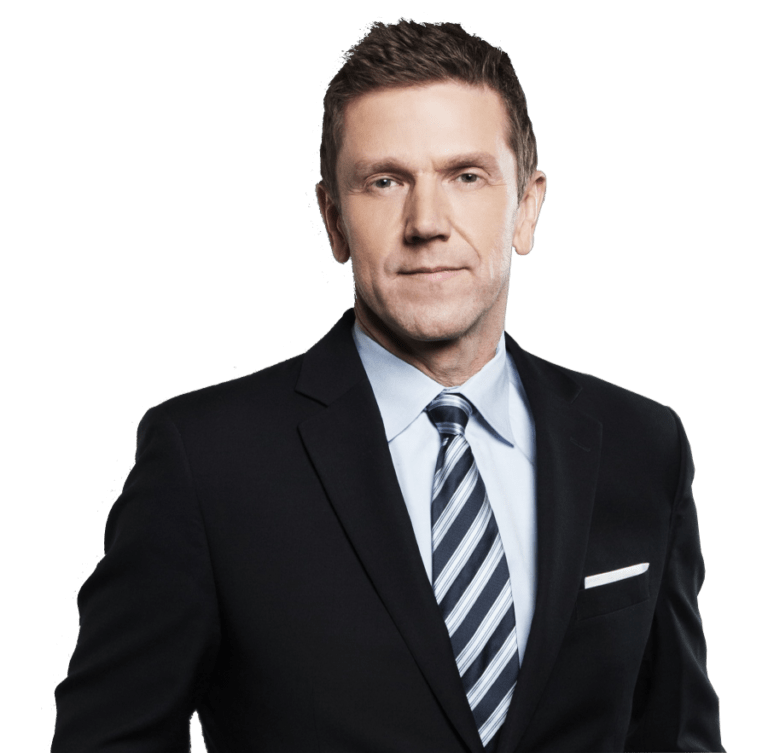Big Spending and Lack of Focus on Financial Goals Catch up with Us Around Middle Age
Here is the picture: A couple sits up in bed on a Sunday morning and looks at each other – they are both age 50.
“Honey, Mike down the street told me last week he is retiring this year. Retiring? Where are we with that? Are we on track with our savings?” “What about the kids? Sara and Tim both head to university in the next two years, and what will that cost? They could be in a post-secondary school for a decade. That could cost hundreds of thousands of dollars – where is that RESP-thing? This problem is going to hit us before retirement”. “And we still have a mortgage. Neither of our parents had mortgages at age 50. Are we behind?”
Canadian, white-collar professionals with no retirement strategy, have I just described you? I call it the convergence of life’s “big three” financial goals at age 50 – retirement savings, children’s education and mortgage payments.
This convergence is also often the first time many Canadian professional families reflect on their goals and their financial planning towards these goals. Sadly, it is often too late by now – if you have not had a plan in place for at least fifteen years, it will be hard to catch up, and something will have to give.
The Financial Challenge You Now Face
Up until now, you were making life work rather easily. Pay cheques cover food and fun each year. You are making contributions to your RRSP and Tax-Free Accounts. You deposit into your child’s RESP. You continue to pay down your mortgage. So, what isn’t working that leads to the scramble and stress between age 50 and 65? Asking yourself will I have enough money for retirement?
You are missing a financial plan and missing the commitment to it.
Saving arbitrary amounts that the newspaper or an advisor spews each year is meaningless to you personally. You need targets for debt elimination, children’s savings and retirement that match your income, net worth, expectations and goals. A dentist earning $300,000/year should not follow RRSP savings levels appropriate for a plumber, yet that is what many professional Canadians do.
It is not enough for professionals to blindly head towards age 50 with no plan, no targets, no benchmarking of progress – nothing. Instead, people give money to stockbrokers, insurance agents and mutual fund sales associates that spin market talk, charge significant fees and hide rates of return leaving the professional family in the dark about whether they are getting ahead – never mind getting ahead at the pace suited to their needs.

It’s About Your Goals – Fake Financial Advisors Don’t Understand This
Everything about your financial and retirement strategy starts and finishes with your financial goals. Fake financial advisors never ask you about your goals. Real financial planners write your goals down, attach estimated costs and timelines to achieve the goals and then report back to you on your progress towards these goals.
If you fall off the plan, they should coach you on what is required to get back on the program. If you have never had this conversation with your financial person, then fire them – they are untrained salespeople that offer you nothing.
Street Talk About your Big Three Financial Goals in Life
Mortgage Planning for Canadians
The amount of mortgage you take on to buy a home should be based on an upper limit of how much of your annual cash flow you can afford to allocate to a mortgage expense while still having a lifestyle and aiming to be mortgage-free – by age 50.
You also need to examine the cost of debt at higher interest rates to ensure you have the financial capability to adapt to higher payments and not have to compromise other elements of your lifestyle. In other words, limit your total debt to what you can quickly pay off in two decades.
Forget about vacation properties and home upgrades – you likely cannot afford to take on more debt in your 40s when I am telling you to be debt-free by 50.
Buying a home and paying it off is the easiest of the big three life financial goals because banks and your paycheque control the process. Moreover, the bank will ensure you pay off the mortgage eventually if you follow their amortization schedules.
The problem is that people’s attitudes and eyes are bigger than their wallets, and many professionals have bitten off more than they can swallow. More Canadians should likely be looking to relocate to smaller cities or other provinces where the cost of housing fits their paycheque or forget about owning a home at all if their current mortgage is too large for their cash flow.

Sadly, if interest rates rise a few more percentage points in Canada, it will be too late for the young professionals to avoid bankruptcy if they are unable to pay their mortgage. Examine today what you can afford tomorrow if your mortgage payments double. Perhaps we have finally caught up to London and New York in some cities in Canada. Rent for life.
No one can spend twenty years or more allocating more than 40% of their paycheque to mortgage cost – too many other things will suffer (new vehicles, vacations, retirement savings) and eventually, your marriage may as well.
Financial Planning for your Children
Clearly it is your decision how many children you may have and raise to financial independence. However, it is my job to cost it out and put a price tag on a family. Post-secondary education in Canada can easily cost $125,000 for four years at an out of town university in 2019. If you have three kids that’s $375,000 to pay for the first degree. Are you paying for grad school too?
Then there are weddings (say you spend $25,000 per child) and home deposits (where you end up kicking in $100,000 per child). So, all in between age 18 and age 30, you may need to invest $750,000 into the financial lives of your three children. Good luck accumulating that much money in eighteen years – the RESP system in Canada is too small to cover even two-thirds of the school cost.
You need to have a plan starting at birth to put money away in an RESP, in trust accounts and your tax-free accounts to be in a position to provide for your children in the manner described above. You need to contribute savings regularly and track progress towards these goals.
Moreover, you need to define the goal in the first place. Almost no professionals we sit down with do this now – instead, they hit age 50, and the first kid goes to university, and much of the three kids’ RESP goes to pay for the first one or two.

However, then the money runs out, you have one kid left, the first kid is also now looking at grad school, and you have to use your retirement savings to pay for your kid’s schooling. Nor have you put a dollar away for their marriages or home deposits, so you plough was supposed to be, and you are now headed towards financial trouble.
Retirement Planning for Canadians
We have all grown up watching our parents and grandparents retire around the age of 60 and so we expect it will be the same for us. It will be hard for a high-income professional family to retire in traditional terms when they are not saving much money each year towards retirement yet expect to maintain the same high level of spending on travel, cars, lifestyle and real estate in retirement.
We are not our parent’s children: we like beautiful things, and a little something called retirement is not going to change that.
Many white-collar professionals are saving the standard RRSP and TFSA account limits identified by the Canadian government. This idea makes no sense. You should keep what you need to replicate your lifestyle desires in retirement.
Canadians need a retirement strategy, and you need to have an expert planner give you savings targets each year and tell you how the program will unfold. Our lifestyle desires today are far from grandma and grandpa living off $30,000/year in retirement, often wearing the same clothes for twenty years, driving one car for twelve years and vacations all inside Canada – you need to plan well in advance to ensure you have the retirement cash flow you want.
How much do you need? If you have been spending more than $100,000 a year in your 50’s on core costs and lifestyle, then you need at least two million dollars of liquid savings (not your home!) at the start of retirement. Even at this level, you will end up spending a good chunk of the capital as well as all the income by the time you die at age 100.
Want a cushion? Then strive for three million in savings. Do you make a much higher income (say $300,000 to $500,000 like a typical doctor, veterinarian, lawyer or dentist)? Then you better strive for three to five million at the start of retirement to keep spending at the same level as you have been accustomed to.
How Do You Achieve Your Goals?
It would help if you had a guiding hand and a well thought out plan with annual targets and reporting on your progress created by a neutral professional. You don’t need money managers and product salespeople that don’t know how to plan.
Also, it would be best if you committed to working towards the plan. After all, it will require you to agree to pay off the mortgage, save for children and save for retirement to make this happen. Retirement strategy for canadians means more balance between future goals and high-living today – a balance that you likely are not doing very well on your own today.
Aside from buying stocks and bonds, engage an expert planner to create a written financial plan that ties together the cost of your goals, your resources, your liabilities and your assets. Have a planner prepare multiple forecasts using sensitivity analysis on key variables to give you a sense of what you need to do – every Canadian would benefit from such a plan.
Then once the program is set up and executed, pay these professionals to once a year come back and report to you on progress, make amendments to the plan and give you a dashboard to enable you to start to know where you are going. This problem is likely the most significant thing missing today: you don’t know where you are going.

Will I have enough for retirement? I’m 50 years old.
It is never too late to step back and create a proper financial plan that integrates your cash flows, assets, liabilities and goals. At age 50, you still have potentially as much as twenty years of your highest income-earning years left to consider.
With your mortgage, kids’ university school costs, and retirement right in front of you, the price of each one is more apparent than ever before. At age 50 we can do more precise planning than any period before – the tradeoff is that your financial costs may be far more significant now (more savings, faster debt elimination) because we are nearing the finish line on all three goals.
The important thing is to get started now – not next year. At this point, every month matters. Also, if your spouse is not committed, then get a plan started by yourself. We will need to get your spouse on board, but that is better left to the professional financial planner to talk to them than you – you are too emotionally tied to each other. One of the greatest value points of a professional planner is the neutrality and objectivity they bring to your lives together.
How do we work through our 3 major financial life goals? (Mortgage, Kids, Retirement)
Ah, you want the answer before you build the plan? Sorry, it doesn’t work that way. Everyone is different, and we need to work through your goals and numbers. However, I will tell you a few critical facts after twenty-five years of working with 50-60-year old’s and their finances:

- It helps if you can come to the table with a clear picture of how long you will financially support children.
- Your home is not your retirement ace in the hole – plan as if you will die in that home at age 100 and have your retirement cash flows provided from savings and pensions. Trust me on this one –downsizing is a lie.
- No one knows how much they spend each year, so there is no way they know what they will spend in retirement. However, experts that do a lot of this planning work can provide reasonable estimates that will get the planning started, and then you fine-tune along the way.
- Anyone that believes /hopes/counts on the stock market for their retirement dreams to come true needs their head examined. We won’t even work with people like this. All the stock market will bring you is stress in retirement – don’t count on it for your essential spending ever.
- Realistically, it may not be possible to pay off your mortgage soon, help your kids the way you want and retire with adequate retirement savings all at the same time. However, we will help you to cost these goals out, prioritize, set timelines and give you an honest perspective on what will happen so you can plan your life and career accordingly.
- Staying in the workforce longer should not be your go-to answer to make this all work. A health issue, car accident, divorce or termination can change anyone’s plans suddenly. You need to get to certain levels of reaching your goals before age 60 regardless of how long you work to have a safety net.
What Do I Do Next? How do I start planning?
I have spent twenty-five years and counting in the trenches with white-collar professionals and their goals and finances. I know your finances better than you do. If you do nothing in the short term, your life will continue to be okay. If you have a good paycheque the mortgage will continue to get paid, the kids’ tuitions will get paid, and your vacations and fancy cars will continue to happen.
Often people in their 50s use a line of credit to pay for their kids’ tuitions and then slowly pay it off. This decision will be at the expense of extra retirement savings required, which you are not doing. In Canada, we have become a cash flow generation – significant incomes that pay for nannies, Audis, yard maintenance teams, private schools and vacations.
All of this can work out fine until you face the one goal that can feel more like a cliff: retirement. That’s the one goal you ignored, delayed or didn’t save enough for. Now at age 50, 55 or even age 60 you are facing retirement at a time when you still have debt, are still supporting your kids and often have inadequate savings to retire – I will define inadequate as less than 1.5 million dollars in total savings.
So here we are. What do you do?
Well, the one thing you cannot do is carry on down this path. You need an expert to build a retirement plan that considers what is realistic. You need an expert to talk frankly to you and your spouse about what retirement will look like and how long you should remain in your career.
When you are feeling burnt out in your career and wish to slow down, you need an expert to tell you if you can afford to make a change for lower pay or retire entirely. You need an expert to tell you when to cut off the kids from your money or whether you will need compensation for your elderly mother’s health care.

Why working with an expert is essential to creating the right financial strategy
You need an expert to give you a frank opinion on whether you need to sell the home to create money for retirement and when moving down the street or across the province is more suitable. An expert to show you how much money you will have to spend every year after tax in retirement and how this can change based on your savings levels, spending levels, inflation, investment returns and goals.
You need help – help from a qualified professional who is an expert in math, taxes and personal finance. This decision is not an investment advisor, insurance agent, robo-advisor, or discount brokerage. You need a professional financial advisor in Toronto. Get started. You’ve delayed long enough, and you are running out of time.
Kurt Rosentreter, CPA, CA, CFP, CLU, CIMA, FCSI, CIM, FMA, TEP is President of Upper Canada Capital in Toronto and a Senior Financial Advisor & Portfolio Manager with Manulife Securities. Kurt is the author of seven books on personal finance and a money management course instructor for accounting associations across Canada. Kurt is the past co-founder of the billion-dollar wealth management practices at one of Canada’s “Big Four” global public accounting firms. With more than twenty-five years of professional experience in Canadian wealth management, Kurt is a popular public speaker nationally and can be regularly found in the national newspapers as an expert on personal finance. Kurt has published more than five hundred articles on money in the last two decades, and his hard-hitting newsletters are popular with Canadians. Kurt, along with his partner Frank Valicek, oversees a national practice of wealth management clients where their team of ten assist with all matters of money.




